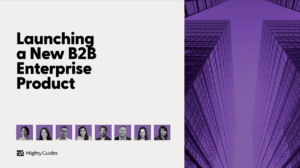
Joe Staples: The Right Tools Reduce Inefficiency, Increase Speed, and Improve Quality
Software tools and automation reduce inefficiencies in the approval process and can help balance workloads among team members. Create clear expectations of turnaround times, and allow for negotiation of deadlines to keep high-priority items on track. Share the...

Amy Protexter: Clear Role Definition and Direction Increase Speed and Creativity
A large team whose members have specialized disciplines ensures that you’ll have all the resources necessary to make decisions on the fly. If the current roles in your organization aren’t effective, re-imagine them into roles that meet your precise needs. Don’t...

Workfront: 10 Experts Share Tips on How to Get Started with Agile Marketing
The book includes insights from the following experts: Andrea Fryrear, SurveyGizmo and MarketerGizmo, Content Marketer and Agile Marketing Evangelist Jim Ewel, AGILE MARKETING, Principal, Leader of High Growth Enterprises David Lesue, Workfront, Creative Director...

Robert Alvin: Foreword – Rethinking Demand Generation
This eBook will completely change the way you think and approach demand generation. I highly recommend sharing the eBook with B2B marketers, executives, and sales teams seeking more won opportunities this year. "Just because someone has ‘VP’ in his or her title...

Heather Vaughan: How One Company Generates Leads With A Disruptive Message Inside Educational Content
Going beyond the C-Suite means attracting the attention of decision influencers who look past the brand and deeper into the solution. A disruptive eBook forces readers to rethink their current solution; it provides educational information that will help them improve....

Brent Adamson: Find and Qualify Mobilizer Leads
No simple formula scales easily to include additional filtering to qualify the leads that traditional methods based on job titles and roles generate. Knowing where Mobilizers go to learn about things helps you determine whether your demand generation content is the...

David Fortino: Marketing Beyond The C-Suite
C-level audiences accounted for just 5 percent of content consumed, yet 94 percent of lead gen campaigns targeted a C-level audience. A review of US content consumption shows that more than half of content syndication campaigns targeted less than one-third of the...

Samantha Stone: The Making of a Champion
In most organizations, the primary purchasing role of C-level executives is signaling that a need exists, and then stepping back so that the team can ask tough questions and develop a business justification. Champions work to drive change for the benefit of the...

Babette Ten Haken: Demand Gen Content Must Recognize The Many Voices In a Buying Decision
For demand generation content to reach and influence a team of decision makers, it must tell stories relevant to the interests and perspectives of people involved in the decision. Answer tough questions often and early. Avoiding those issues only serves to fuel...

Tim Riesterer: Find Your Disruptive Story
To defeat status quo thinking, you must move beyond “voice of the customer” research. Unconsidered needs must prove the argument you make about the high cost of not making a change; map these needs directly to valuable capabilities of your solution. Introduce...


